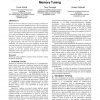Free Online Productivity Tools
i2Speak
i2Symbol
i2OCR
iTex2Img
iWeb2Print
iWeb2Shot
i2Type
iPdf2Split
iPdf2Merge
i2Bopomofo
i2Arabic
i2Style
i2Image
i2PDF
iLatex2Rtf
Sci2ools
JCSC
2002
2002
Power Estimator Development for Embedded System Memory Tuning
Memory accesses account for a large percentage of total power in microprocessor-based embedded systems. The increasing use of microprocessor cores and synthesis, rather than prefabricated microprocessor chips, creates the opportunity to tune a memory hierarchy to the one program that will execute in the embedded system. Such tuning requires fast and accurate estimation of the power and performance of different memory configurations. We describe a general three-step approach to developing such estimators, based on our experiences on several different projects. Each step is increasingly fast, using the previous step to gauge accuracy. The first step uses high-level functional simulation, the second step uses trace simulation, and the third step uses equations. A tool developer can follow these three steps to create a powerful environment for core users to support synthesis of the best memory hierarchy for a particular embedded system. The approach can be applied to components other than...
Embedded System | JCSC 2002 | Memory Hierarchy | Step |
Related Content
| Added | 22 Dec 2010 |
| Updated | 22 Dec 2010 |
| Type | Journal |
| Year | 2002 |
| Where | JCSC |
| Authors | Frank Vahid, Tony Givargis, Susan Cotterell |
Comments (0)

